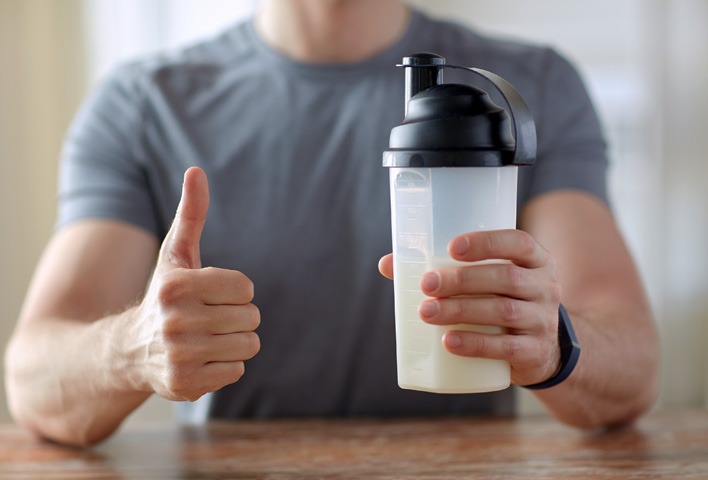In the world of fitness, muscle-building, and overall wellness, protein supplements like whey protein have become a staple. They’re widely used by athletes, bodybuilders, and health-conscious individuals alike due to their role in promoting muscle recovery, growth, and overall health. But did you know that the way we digest protein and absorb its amino acids can be enhanced by probiotics?
Understanding Whey Protein and Its Role in Muscle Health
Whey protein is a high-quality protein derived from milk during the cheese-making process. It is packed with essential amino acids, especially branched-chain amino acids (BCAAs) like leucine, isoleucine, and valine, which are vital for muscle protein synthesis. This makes whey protein a popular choice for those looking to enhance muscle recovery, growth, and overall performance.
However, the efficiency of protein digestion and amino acid absorption plays a critical role in determining how well the body benefits from the protein consumed. While whey protein is generally well-absorbed, digestive issues or imbalances in the gut microbiome can sometimes hinder the optimal breakdown and absorption of amino acids, ultimately reducing its effectiveness.
The Role of Probiotics in Protein Digestion and Amino Acid Absorption
Probiotics play a critical role in enhancing protein digestion and amino acid absorption by promoting a healthy and balanced gut microbiome. Protein digestion begins in the stomach, where enzymes break down the protein into smaller peptides. However, the majority of amino acid absorption takes place in the small intestine. A healthy gut microbiome ensures that the digestive process occurs efficiently, as beneficial bacteria help maintain a healthy gut lining, promote the production of digestive enzymes, and reduce gut inflammation. Probiotics such as Lactobacillus, Bifidobacterium and Bacillus strains support the gut barrier, ensuring that proteins are broken down properly into amino acids. This allows for optimal absorption into the bloodstream, providing the body with the amino acids needed for muscle recovery, immune function, and overall health.
In addition to improving digestion, probiotics enhance the absorption of amino acids by balancing the gut microbiota. An imbalance in gut bacteria, or dysbiosis, can lead to impaired digestion and reduced nutrient absorption, including amino acids. Probiotics help restore this balance by increasing the population of beneficial bacteria, which supports the breakdown of proteins and efficient amino acid absorption. By reducing gut inflammation and supporting enzyme function, probiotics can also alleviate conditions that disrupt protein digestion, such as irritable bowel syndrome (IBS) or leaky gut syndrome. Ultimately, by enhancing the body’s ability to absorb amino acids, probiotics help maximize the benefits of dietary protein, supporting everything from muscle growth to immune health and beyond.
The Synergistic Benefits of Whey Protein and Probiotics
The combination of whey protein and probiotics like Bacillus coagulans offers several key benefits for overall health:
- Improved Amino Acid Absorption: The probiotic enhances the breakdown and absorption of amino acids from whey protein, ensuring that your body makes the most of the protein you consume.
- Muscle Growth and Recovery: Better amino acid absorption supports more efficient muscle protein synthesis, which is crucial for muscle growth, repair, and recovery after exercise.
- Gut Health Support: Probiotics contribute to a balanced gut microbiome, supporting digestion, nutrient absorption, and immune function—essential factors for overall well-being.
Why Supplement Whey Protein with Bacillus coagulans SNZ 1969®?
Bacillus coagulans SNZ 1969® is a spore-forming probiotic strain known for its resilience and stability in the digestive system. Unlike many other probiotics that may not survive the acidic environment of the stomach, Bacillus coagulans SNZ 1969® can withstand harsh conditions, ensuring that it reaches the gut alive, where it exerts its beneficial effects.
Probiotic strain Bacillus coagulans SNZ 1969® has shown the ability to support both protein digestion and amino acid absorption, while also positively influencing skin health. Clinical studies have revealed that the group receiving both the probiotic and whey protein experienced a significantly lower incidence of acneiform lesions.
Bacillus coagulans SNZ 1969® has a proven track record of over five decades of use across various age groups. Backed by more than 30 clinical studies, it has been shown to support gut health, including improving gastrointestinal discomfort, intestinal motility, and managing intermittent constipation in healthy individuals. Furthermore, this probiotic strain has demonstrated significant benefits for oral health, immunity, and women’s health.





